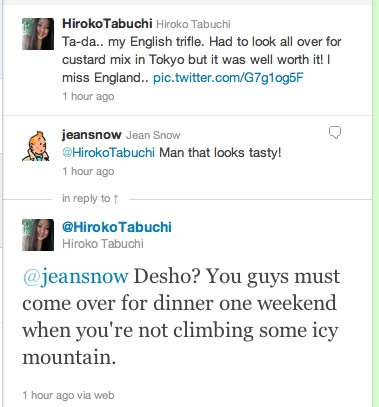You’ll have to forgive me – this semester has been insane. Japanese is still happening, almost on an everyday basis, but often it’s in my dreams. I have been reading Dance Dance Dance in Japanese with the hopes of translating some of the abridged sections this upcoming September. But other than that, I’ve been teaching, reading, and writing English. Here’s a quick lame post so that I don’t skip February.
I wrote about でしょう a couple years ago and wasn’t able to give a really good example of the tone that I was trying to express. Well, I was watching my Twitter feed not too long ago and caught this interaction between New York Times reporter Hiroko Tabuchi and Jean Snow of Neojaponisme:
Tabuchi’s でしょう I think accurately captures what I was trying to communicate – it’s almost along the lines of the tone of the English amirite? or rite?
To further impress this upon you, I have recorded my own versions of the various でしょう tones. Here is How to Japanese Podcast Ep 2, which is so short that it doesn’t even deserve a time index. Hope this is helpful.


I have always thought of “deshou” as meaning something along the lines of “isn’t it so?”. It’s desu, with a suffix indicating probability, or “so it is, probably”. Something like that, anyway, deshou? In some contexts, it can certainly be approximated by “amirite?”, but in others it may mean more like “aren’t you right?” or “isn’t he right?” I’m no expert, however. I am a Nissei (but it’s complicated, I’m a half-Japanese American, born in Japan, but raised mostly in English-speaking environments), living in New Orleans since 1999.
More podcasts! :)